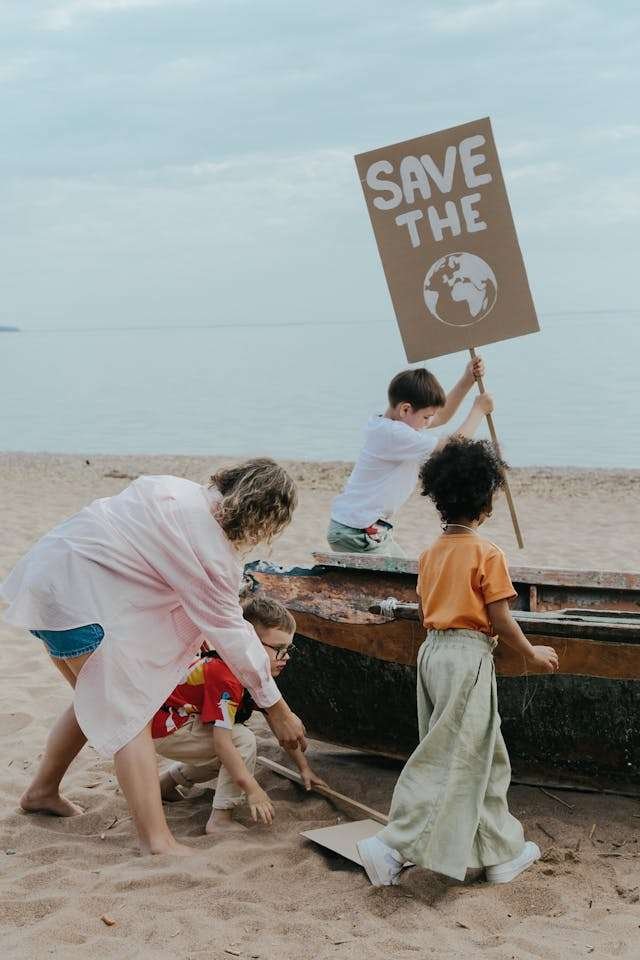Saving water is a must if we want a sustainable future for our children. Approximately four billion individuals, roughly equating to nearly two-thirds of the global populace, endure severe water scarcity for a minimum of one month annually UNICEF
More than two billion people reside in nations with insufficient water supply. It is projected that by as soon as 2025, half of the world’s population may inhabit regions confronting water scarcity.
Water is the essence of life but are we serious about preserving it for the future generations?
Saving water for our children- why?
In our relentless pursuit to secure a prosperous future for our children, we often prioritise saving money and accumulating wealth. But amidst our financial planning, we often overlook one critical aspect essential for our children’s survival and well-being: water.
Water is necessary for our existence. Yet, we continue to exploite this precious resource without realizing the grave consequences it may have on our children’s future.
As parents, we continuously save money for our children’s education, healthcare, and financial security. However, we must ask ourselves: What good is wealth if our children inherit a world plagued by water scarcity and pollution?
The harsh reality is that our planet is facing a severe water crisis, majorly caused by climate change, pollution, and unsustainable consumption practices. Millions of people, including children, are already grappling with water scarcity, facing the grim prospect of thirst, disease, and poverty.
If we fail to act now and continue to waste water recklessly, we risk depriving our children of their most basic need: clean and safe drinking water.
Imagine a world where our children struggle to find water for drinking, bathing, and sanitation—a world devoid of the joy of splashing in puddles, swimming in rivers, or enjoying a refreshing glass of water on a hot day.
What will happen if we don’t start saving water NOW?
If we fail to initiate water conservation efforts promptly, we risk facing severe consequences that could affect both the environment and human populations. Here are some potential outcomes backed by statistics:
- Water Stress Intensification: According to the United Nations, by 2050, global water demand is projected to increase by 20-30%, and without significant changes in water management, water stress levels are expected to escalate. This means more regions will face water scarcity, exacerbating existing challenges.
- Impact on Agriculture: Agriculture accounts for about 70% of global freshwater withdrawals. Without proper water management, agricultural productivity could decline, leading to food shortages and economic instability. Studies suggest that water scarcity could reduce crop yields by up to 50% in some regions.
- Economic Losses: The World Bank estimates that water scarcity could cost some regions up to 6% of their GDP by 2050. This loss includes impacts on agriculture, industry, and other sectors dependent on water resources. Inefficient water use could also lead to increased costs for water treatment and infrastructure maintenance.
- Environmental Degradation: Water scarcity can have devastating effects on ecosystems, leading to habitat loss, biodiversity decline, and water pollution. Reduced water flow in rivers and streams can disrupt aquatic ecosystems, endangering fish populations and other aquatic species.
- Social Unrest and Migration: Water scarcity has been linked to social unrest and conflict in many parts of the world. Competition for water resources can exacerbate tensions between communities and even nations. Additionally, water scarcity can force people to migrate in search of water, leading to displacement and potential humanitarian crises.
- Health Impacts: Lack of access to clean water and sanitation facilities can lead to waterborne diseases, such as diarrhea and cholera, which disproportionately affect children in developing countries. According to the World Health Organization, inadequate water supply and sanitation contribute to 88% of deaths from diarrheal diseases globally.
Keeping your water tanks clean non-invasively also helps you save water!
Failing to address water conservation now could lead to dire consequences, including increased water stress, agricultural losses, economic hardships, environmental degradation, social unrest, and health risks. It is imperative to implement sustainable water management practices and promote water conservation efforts to mitigate these potential outcomes.
It’s time to awaken to the reality of our water crisis and take urgent action to conserve and protect this finite resource.
By adopting simple yet effective water-saving practices in our daily lives, such as fixing leaks, using water-efficient appliances, and practising mindful consumption, we can make a tangible difference.
Furthermore, we must advocate for sustainable water management policies, invest in water infrastructure, and support initiatives aimed at protecting our rivers, lakes, and groundwater reserves.
As responsible citizens of the planet and guardians of our children’s future, let us commit to safeguarding our precious water resources.

Conclusion- Saving water for our children
Let us remember that by saving water today, we are ensuring a brighter and more sustainable tomorrow for our children—a future where they can thrive, flourish, and enjoy the abundance of this vital resource.
So, let’s heed the call to action and make every drop count. Our children are depending on us, and their future depends on the choices we make today.
Together, let’s build a world where water flows freely, sustaining life and nurturing generations to come.
Save water-save earth-save everyone!
Follow GD Water Consult on Instagram